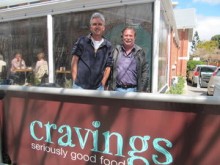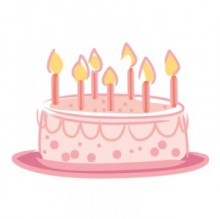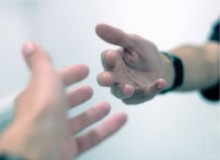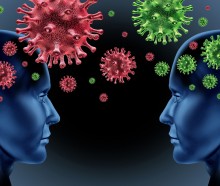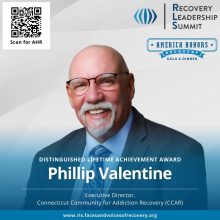 A huge congratulations to Phil Valentine of Connecticut Community of Addiction Recovery (CCAR), who recently received a Distinguished Lifetime Achievement Award from Faces & Voices of Recovery (FAVOR) in the US.
A huge congratulations to Phil Valentine of Connecticut Community of Addiction Recovery (CCAR), who recently received a Distinguished Lifetime Achievement Award from Faces & Voices of Recovery (FAVOR) in the US.
Here is a beautifully made short film on Instagram of Phil. In relation to Phil’s acceptance speech, the post reads: ‘This speech, filled with poise and humility, sheds light on how deserving Phil is of this award.’
Phil’s parting words in his speech: ‘Recovery is love. Letting love in and the ability to love and care for others. So my parting words to all of you: Let love in. Self-care is letting love in. If your soul is a well of love, how full is your well.’
A simply amazing man! Such a deeply moving film!!

 Here’s some wise words from one of my favourite people working in the mental health recovery field, Pat Deegan. This blog first appeared on Pat’s
Here’s some wise words from one of my favourite people working in the mental health recovery field, Pat Deegan. This blog first appeared on Pat’s  For anyone interested in the healing of childhood trauma, I strongly recommend you read,
For anyone interested in the healing of childhood trauma, I strongly recommend you read,  Whilst looking through my collection of ‘voices of recovery’ to see what might be appropriate for the book on recovery I’m writing, I came across this Recovery Stories blog post from September 2013. This is the first of a series of posts that Rosie first wrote on our online Wired In To Recovery community website which ran from 2008-12.
Whilst looking through my collection of ‘voices of recovery’ to see what might be appropriate for the book on recovery I’m writing, I came across this Recovery Stories blog post from September 2013. This is the first of a series of posts that Rosie first wrote on our online Wired In To Recovery community website which ran from 2008-12.
 One of the key messages that I have been putting out over the years that I have worked in the recovery/healing field is about the importance of community. Here is an excellent article from
One of the key messages that I have been putting out over the years that I have worked in the recovery/healing field is about the importance of community. Here is an excellent article from 